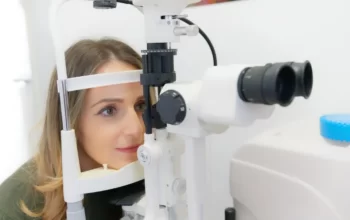
Given that 1 in 6 Americans suffer from allergies, they are one of the most prevalent chronic conditions. An allergic reaction occurs when our immune system overreacts to allergens like pet hair or pollen. As a result, you might occasionally experience an allergic reaction or encounter allergens every day.
Allergies to the eyes may be dangerous and distracting. Some allergy symptoms, such as sneezing or a stuffy nose, may be familiar to you. But can you list every symptom that allergies can have on the eyes? Although the symptoms of dry eyes and eye allergies are similar, can allergies actually cause dry eyes?
What Is Dry Eye?
Tear production is impacted by dry eye, which leaves too few or poor-quality tears. Your eye health depends heavily on your ability to produce tears. The tear film keeps the eye’s surface clean, guards against infection, and nourishes the eye.
A dry environment, insufficient hydration, or insufficient sleep can all contribute to temporary dry eye. The long-term effects of dry eye disease (also known as dry eye syndrome) on vision and eye health are, however.
The following are typical signs of dry eye:
- Blurry vision
- Burning or scratchy eyes
- Light sensitivity
- Redness
- Stringy mucus
- Watery eyes
Chronic dry eye left untreated can result in infections and corneal scarring, as well as complications that affect vision and eye health.
What Causes Dry Eye?
Environmental factors, medications, and underlying medical conditions can all be causes of dry eyes.
The American Academy of Opthalmology (AAO) lists the following as potential causes of dry eyes:
- being in a dry environment or heavy wind
- smoke
- medical conditions, such as thyroid disease or rheumatoid arthritis
- prolonged use of contact lenses
- staring at a computer screen for an extended period
- a reaction to medications, such as antihistamines, antacids, beta-blockers, antidepressants, or anxiety medications
- response to surgery
Possible allergens or irritants that can cause dry eyes to include:
- pet dander
- pollen from trees, grasses, or weeds
- exhaust fumes
- dust mites
- cigarette smoke
- mold
- perfume
Dry Eye Symptoms
Due to the extreme dryness, it causes, dry eyes—as the name implies—can feel burning. Your eyes become dry because there aren’t enough tears to keep them moist.
Dry eyes can result in burning and redness, just like allergies can. The itching and swelling that allergies can bring on are not brought on by a lack of tears, though.
Vision issues may result from untreated dry eyes. Light sensitivity and blurry vision are a couple of them. In the most severe circumstances, eye damage may become permanent.
Allergy Symptoms
Allergic conjunctivitis is another name for allergies of the eyes. It is not contagious, in contrast to bacterial and viral conjunctivitis. Itching is the primary symptom that distinguishes eye allergies from other eye conditions.
If you accidentally rub your eyes, the itching might be so bad that you start crying and get a red eye. If your eyes aren’t itchy, then your symptoms may be attributed to another eye condition.
Your eyes may have puffy skin around them and beneath them. Occasionally, a condition known as allergic shiners causes dark under-eye circles. You might even become sensitive to light.
You might also have watery eyes and teary eyes that never stop. You might feel compelled to rub your tears out of your eyes because you’re uncomfortable, but this can exacerbate the redness. They may also burn.
What Connects Allergies And Dry Eyes?
In a 2015 study, an allergy index was compared to the monthly prevalence of dry eye cases over a five-year period. They found some connections between the two. The researchers discovered that in April, both dry eye cases and pollen levels peaked annually. They also discovered that every spring is when cases of dry eyes peak seasonally. A second increase happens during the winter, and it’s most likely brought on by indoor heating causing low humidity. Finally, the group found that the incidence of dry eye was lowest in the summer.
By identifying this connection, more is known about the environmental factors that cause dry eyes. Based on the season, doctors can now provide better patient care for dry eye symptoms. You can prevent your dry eyes from getting worse during the spring allergy season, for instance, by using air filters indoors and wearing safety goggles when gardening. In the winter, using a humidifier can also help reduce the irritation that comes with dry eyes.

What Effect Do Allergies Have On Your Eyes?
Even if an allergen doesn’t touch your eye directly, allergies can still affect your eyes. It’s possible that an allergen irritates the tissues in your face, triggering an immune reaction that affects your entire body.
For instance, the sinuses are situated in the voids above, between, behind, and beneath the eyes. You frequently feel the effects of infected or inflamed sinuses in your eyes. Eye swelling or discomfort can even be brought on by a toothache!
Allergic conjunctivitis, also known as eye allergies, causes immediate eye irritation. More than 20% of people in the population have allergic conjunctivitis. Allergic conjunctivitis is not contagious, in contrast to other types of conjunctivitis (pink eye). Instead, only allergens or irritants can trigger it, and this reaction may be particular to you.
Asthma can cause a variety of eye symptoms, including:
- Burning or irritation
- Excessively watery eyes
- Dry eyes
- Eyelid swelling
- Itchy eyes
- Light sensitivity
- Redness
You might also experience allergy shiners, which are swollen eyes. As an alternative, allergic shiners can resemble bruises or dark circles under your eyes.
How Do Seasonal Allergies Add To Dry Eye?
Many people who have dry eyes experience symptoms like itching, dryness, excessive watering, sensitivity to light, eye fatigue, fluctuating vision, and the sensation that something foreign is in the eye. The symptoms of seasonal allergies may be similar, but their defining feature is itching. Histamine is released if your eyes are hypersensitive to allergens like pollen or pet dander. Your eyes itch, water, and turn red as a result of this immune reaction.
Dry eye syndrome symptoms resemble those of seasonal allergies. It can therefore be challenging to distinguish between the two at times. During springtime, allergies to pollen cause discomfort. By chance, this is also the peak season for dry eye syndrome.
During the spring and summer months, you may spend more time outdoors, which can exacerbate the symptoms of dry eyes. Your use of sunscreen and exposure to sunlight, perspiration, and dust can irritate your eyes more. During these times, pollen and other particles can worsen your current symptoms of dry eye syndrome or start a new case. Occasionally, a person may experience both allergies and dry eyes.
Preventing Allergies & Dry Eye
There are several steps you can take to prevent or treat your allergy symptoms, including dry eyes, depending on what you’re allergic to. Below are a few general pointers:
- Applying artificial tears to add moisture & wash allergens out of your eyes
- Closing windows when pollen counts are high
- Using air purifier devices to reduce allergens indoors
- Washing your hands & avoiding touching your eyes after petting a dog or cat
- Wearing sunglasses outside to help keep pollen out of your eyes
Artificial tears can ease the symptoms of dry eyes and allergies, but it’s important to pick the right kind of eye drops. Preservatives are often added to eye drops to extend their shelf life and stop bacteria growth. Preservatives can make some people sensitive, either right away or over time.
When considering eye drops for allergies, it might be preferable to use preservative-free eye drops. The eye drops that your optometrist thinks you should use or alternative options are available.
How Can The Symptoms Be Reduced At Home?
You can prevent triggers that aggravate your condition, whether you have dry eyes or seasonal allergies. In addition to pollen, some of the typical offenders include dry air, wind, and smoke.
If you’re doing yard work, woodworking, or dusting, cover your eyes by putting on safety goggles. Live a lifestyle that is kind to your eyes. These consist of frequently pausing while working on a computer or performing minute tasks. Eat foods high in fatty acids and abstain from secondhand smoke. And most importantly, get regular eye care. Maintaining your annual eye exams will help you avoid issues.
Conclusion
The comfort and health of the eyes can be improved by treating dry eye or eye allergies, regardless of the underlying cause. In this case, get in touch with us if you’re having vision problems or any eye symptoms. Eye exams enable us to identify your eye care requirements and talk about specialized solutions.



